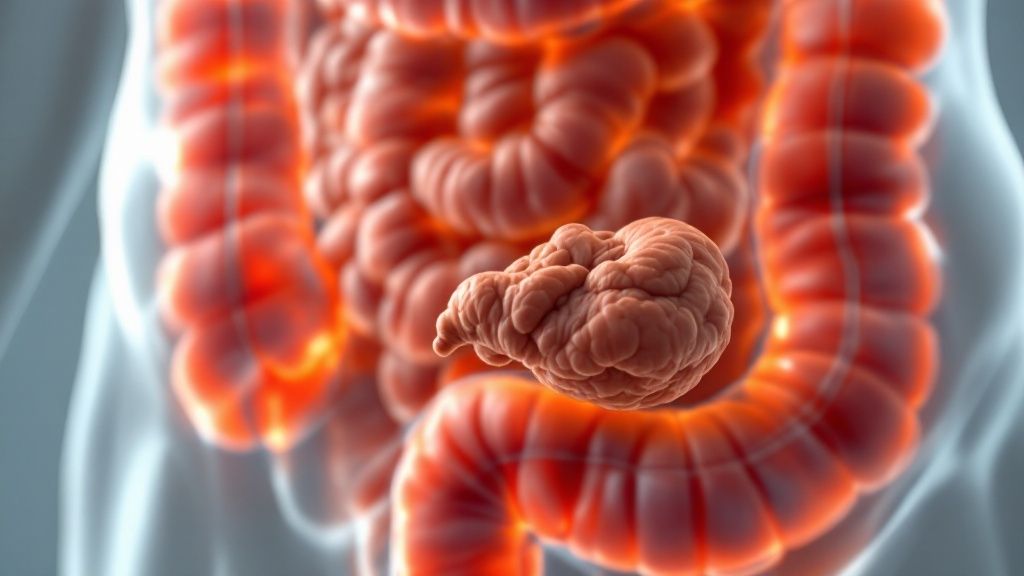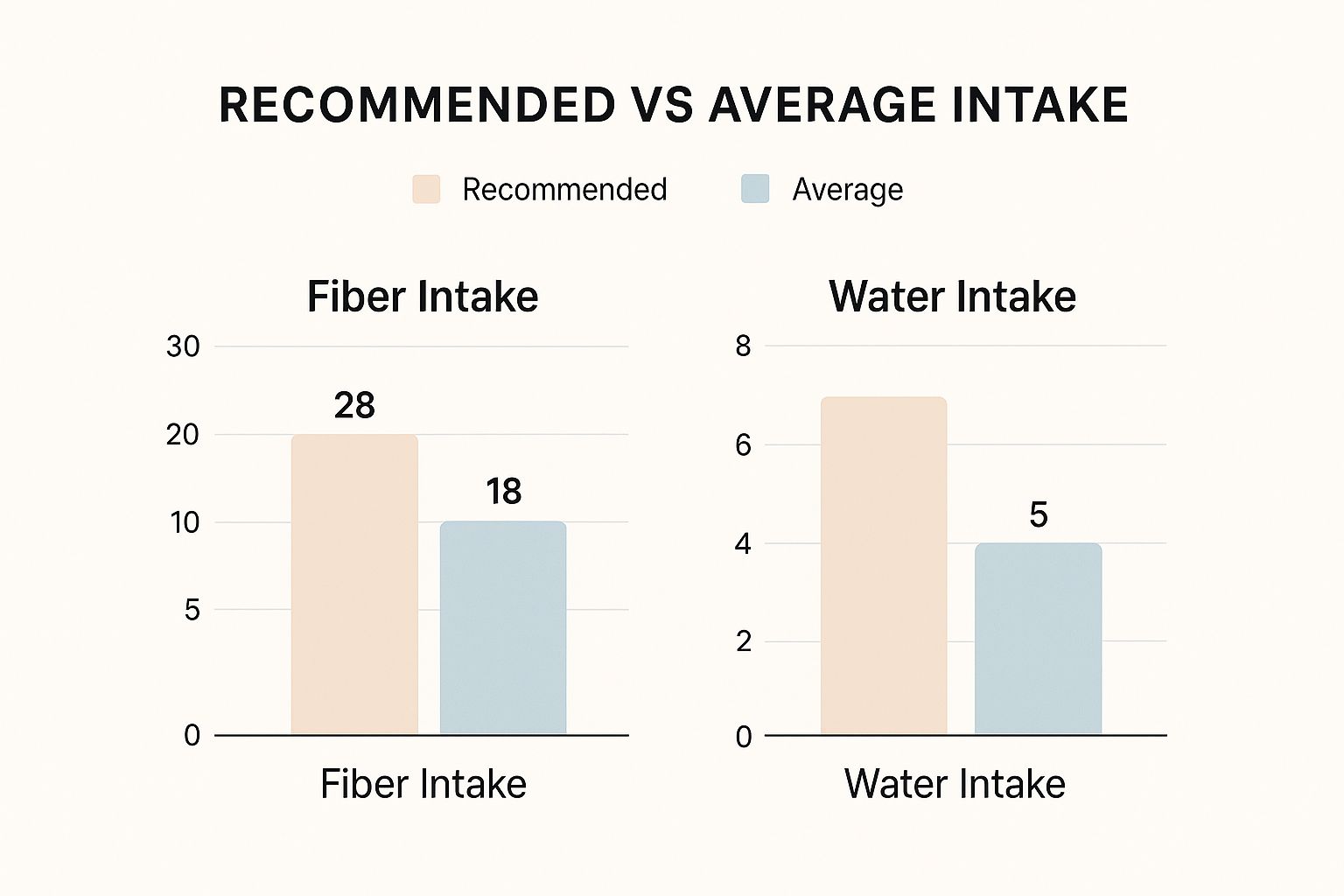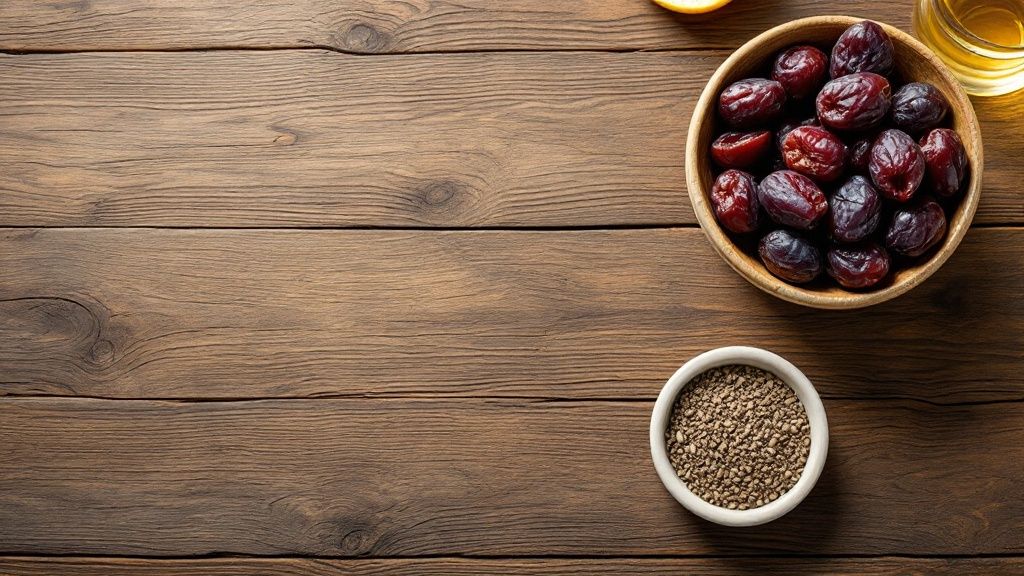If you're struggling with hard stool, the solution often comes down to a simple, powerful trio: dietary fiber, plenty of fluids, and regular movement. These three elements are the cornerstone of healthy digestion. They work in tandem to add the necessary bulk and water to your stool, making it much easier to pass. The good …
If you're struggling with hard stool, the solution often comes down to a simple, powerful trio: dietary fiber, plenty of fluids, and regular movement. These three elements are the cornerstone of healthy digestion. They work in tandem to add the necessary bulk and water to your stool, making it much easier to pass. The good news is that even small adjustments, like adding more fruit to your diet and keeping a water bottle handy, can bring noticeable relief in just a few days.
Why Stools Become Hard and How to Find Relief

It’s easy to get frustrated when dealing with the discomfort of hard stools, but understanding what’s happening inside your body is the first real step toward relief.
At its most basic level, hard stool is just stool that doesn't have enough water. As waste makes its way through your colon, the organ’s main job is to absorb water. If this journey—what we call colonic transit—is too slow, the colon gets a little overzealous and absorbs too much water. The result? Stool that’s dry, hard, and a real challenge to pass.
This isn't just a minor annoyance; it's a primary symptom of constipation, a condition affecting about 12% of people worldwide. Certain groups, like kids and older adults, experience it even more often, and women are nearly twice as likely to be affected as men. For a deeper dive into these statistics, the Journal of Neurogastroenterology and Motility offers some comprehensive research.
The slowdown in your digestive system usually traces back to a few key lifestyle and dietary habits.
Common Causes Behind Hard Stools
So, what’s putting the brakes on your system? A few common culprits are often at play. See if any of these sound familiar.
- Not Enough Fiber: Think of fiber as a sponge. It soaks up water and adds much-needed bulk to your stool, helping it pass smoothly. A diet low in fiber often leads to stool that’s small and compact.
- Dehydration: This one is a direct link. If you're not drinking enough, your body will conserve water wherever it can—and that includes pulling extra from your colon. This is a fast track to hard, dry stools.
- A Sedentary Lifestyle: Movement matters. Physical activity stimulates the natural muscle contractions in your intestines that keep everything chugging along. Too much sitting can lead to a sluggish gut.
- Ignoring the Urge to Go: We've all done it. But consistently putting off a bathroom trip can weaken the signals between your brain and your bowels, which can contribute to long-term constipation.
By focusing on these core areas—what you eat, how much you drink, and how often you move—you’re doing more than just fixing a symptom. You're supporting your body's natural rhythm for lasting comfort and regularity.
Building Your Diet For Softer Stools
What you eat every single day plays the biggest role in loosening up hard stool. Simply hearing “eat more fiber” isn’t enough—knowing which types and how much makes all the difference.
Understanding Fiber Types
Your digestive system thrives on a balance of soluble and insoluble fiber. They work hand in hand:
- Soluble Fiber: Turns into a gel in your gut, keeping stool moist and slippery.
- Insoluble Fiber: Adds bulk to stool, helping it move through your intestines more efficiently.

Most of us don’t hit the 25 to 30 grams of daily fiber experts recommend. In fact, average intake often sits below 15 grams, and that shortfall, paired with low fluid intake, makes stool stubbornly hard.
How To Gradually Increase Your Fiber Intake
A sudden fiber overload can backfire—think cramps, bloating, and gas. Instead, build in one extra high-fiber item every few days.
For instance, stir a tablespoon of chia seeds into your yogurt one morning. A couple of days later, switch white rice for brown at lunch. Small tweaks like this give your gut time to adapt.
Aim for 25 to 30 grams of fiber each day, and pair it with plenty of water. This simple combo helps your stool stay soft and pass more easily.
High-Fiber Foods For Softer Stool
Below is a quick reference to simplify your grocery runs. Adding just one or two of these per meal can really move the needle.
| Food Item | Serving Size | Fiber Type | Approximate Fiber (grams) |
|---|---|---|---|
| Pear (with skin) | 1 medium | Soluble & Insoluble | 5.5 |
| Lentils | ½ cup cooked | Soluble & Insoluble | 8 |
| Broccoli | 1 cup chopped | Insoluble | 2.4 |
| Chia Seeds | 1 tbsp | Soluble | 5 |
| Oats (rolled) | ½ cup dry | Soluble | 4 |
| Almonds | ¼ cup | Insoluble | 3.5 |
This table makes it easy to spot high-impact choices for breakfast, lunch, dinner, or snacks. Mix and match based on your taste and schedule.
Building these habits is a hands-on experiment—you’ll learn what works best for your body. Once you consistently hit that 25–30 gram mark, you’ll notice stool becomes much softer and easier to pass.
For more tips on supporting your gut, dive into our Improve Digestive Health guide.
Smart Hydration for Better Digestion

While we talk a lot about fiber for digestive health, it’s only half of the equation. Water is the other crucial half. Without enough fluid, all that fiber you’re adding to your diet can backfire, creating something dense and hard to pass instead of the soft, bulky stool you're aiming for.
Think of it this way: your colon needs a steady stream of water to keep things moving smoothly. If you're dehydrated, your large intestine will pull water from your stool to use elsewhere in the body. This is a survival mechanism, but it leaves your stool dry, hard, and painful to pass. It's one of the most direct causes of constipation.
How Much Water Do You Actually Need?
The old “eight glasses a day” advice is a fine starting point, but it's not a one-size-fits-all solution. Your individual needs depend on your body, activity level, and even the climate you live in.
A much better guideline is to drink half your body weight in ounces of water each day. So, if you weigh 160 pounds, your target should be around 80 ounces. If you’re active, sweating from a workout, or enjoy caffeinated drinks like coffee, you'll need to up that amount to compensate.
One of the easiest habits to build is simply carrying a reusable water bottle with you. Having it in sight serves as a constant reminder to sip throughout the day, making it much easier to hit your goal.
It’s not just about how much you drink, but how you drink it. Sipping water steadily all day long is far more effective for softening stool than chugging a huge glass two or three times a day.
More Than Just Plain Water
Let's be honest, drinking plain water all day can get boring. The good news is, you don't have to. Plenty of other drinks and even foods can count towards your daily hydration goal, making it easier and more enjoyable to stay on track.
Feel free to mix it up with some of these hydrating options:
- Herbal Teas: Caffeine-free teas like peppermint, ginger, and chamomile are fantastic. Not only do they hydrate, but they can also have a calming effect on the digestive system.
- Clear Broths: A warm cup of bone broth or a light vegetable broth can be incredibly soothing. It’s a nourishing and hydrating alternative, especially on a cool day.
- Water-Rich Foods: You can also eat your water! Many fruits and vegetables are packed with fluids and are an excellent way to boost hydration naturally.
Snacking on a few slices of watermelon or adding cucumber to your salad is an effortless way to increase your fluid intake. These foods are over 90% water and come with the added bonus of vitamins and minerals.
By taking a varied approach, you make hydration a sustainable habit rather than a chore. It’s a smart strategy for keeping your digestive system happy in the long run.
Lifestyle Habits That Promote Regularity

While what you eat and drink are huge pieces of the puzzle, your daily habits have just as much power to soften hard stool. Small, consistent lifestyle tweaks can get your digestive system moving, calm stress, and make going to the bathroom a much smoother experience. Think of it as creating the perfect environment for your gut to thrive.
One of the best non-dietary things you can do is simply move your body. Physical activity stimulates the natural wavelike muscle contractions in your intestines, a process called peristalsis. This is what pushes stool through your colon, and keeping that rhythm steady prevents it from sitting too long and drying out.
You don't need to run a marathon to get the benefits. Gentle, low-impact movement is often all it takes.
- Brisk Walking: A simple 20-30 minute walk each day is fantastic for encouraging bowel motility.
- Yoga: Certain poses, especially gentle twists like a supine spinal twist, act like an internal massage for your abdominal organs, nudging things along.
- Stretching: Even basic stretches for your core and lower back can relieve tension that might be hindering your digestive flow.
Establish a Consistent Bathroom Routine
Believe it or not, your body thrives on routine—and your bowels are no exception. By setting aside time each day, you can actually train your body to have a bowel movement around the same time, making the whole process less stressful and more predictable.
Try to carve out 10-15 minutes after a meal (breakfast is often a great time) to just sit on the toilet. Eating naturally stimulates the colon, so you're working with your body's signals. Bring a book or listen to some music, but try to avoid scrolling on your phone; the goal is to be relaxed and present, not distracted. Give your body a chance to work without feeling rushed.
The most important tip? Don't ignore the urge to go. When your body tells you it's time, listen. Holding it in on a regular basis can actually weaken the nerve signals in your rectum, making constipation worse over time.
Manage Stress to Relax Your Gut
The gut-brain connection is no joke. When you're stressed out, your body pumps out hormones like cortisol, which can throw your entire digestive system for a loop. For many, this slows everything down, giving the colon extra time to absorb water from the stool, leading to constipation.
Finding healthy ways to cope with stress will directly benefit your gut. This could be anything from deep breathing exercises and meditation to simply spending quiet time in nature. Just a few minutes of mindfulness can calm your nervous system, which in turn helps your digestive muscles relax. If you also struggle with gas and discomfort, learning how to relieve bloating can provide even more comprehensive relief.
Optimize Your Toilet Posture
This last one is a simple mechanical fix that can make a world of difference. The way we sit on modern toilets actually puts a kink in our colon, making it physically harder for stool to pass. It’s an unnatural angle that forces us to strain.
By elevating your feet with a small stool or a squatting device, you change your body's alignment to mimic a natural squat. This posture relaxes a key muscle (the puborectalis), which straightens out the final part of the colon. The result is a clearer, easier path for stool to exit. For many people, this one small change provides the quickest relief from straining.
Finding Relief with Over-the-Counter and Natural Remedies
Sometimes, even with the best diet and lifestyle changes, you need a little extra help to get things moving. That's where over-the-counter (OTC) and natural remedies come in. Think of these not as a long-term fix, but as a temporary bridge to help soften hard stool while your healthier habits start to pay off. Knowing what to look for is crucial for finding gentle, effective relief without becoming dependent.
You're not alone in this search; constipation is incredibly common. The global market for treatments was projected to hit nearly US$22.93 billion by 2025, with laxatives leading the charge simply because they're accessible and they work. Knowing how they work is the key to picking the right one for you. You can read more about these market trends on transparencymarketresearch.com.
Navigating the Pharmacy Aisle for OTC Solutions
Staring at a wall of options in the pharmacy can feel a bit overwhelming. Let's break it down. Most of these remedies fall into a few categories, and they all have a different way of softening stool.
- Bulk-Forming Agents: I usually recommend starting here. These are the gentlest options. Products with ingredients like psyllium husk or methylcellulose essentially act like a sponge in your colon. They soak up water, which adds much-needed softness and bulk to your stool, making it easier to pass. It's like giving your system a concentrated fiber boost.
- Osmotic Laxatives: These work a bit differently. Instead of just absorbing water that's already there, they actively pull more water into your intestines from the surrounding tissues. This influx of fluid is great at softening hard, dry stool. Look for ingredients like polyethylene glycol or magnesium hydroxide.
You'll also see stimulant laxatives on the shelf. These are a different beast altogether. They work by directly stimulating the muscles in your intestines to contract. They should be a last resort and used for a very short time, as it's easy for your body to become reliant on them.
My Two Cents: For a bout of occasional hard stool, always start with the mildest choice. A bulk-forming agent or a gentle osmotic laxative is often more than enough to get your system back on track comfortably.
Trusted Natural Aids for Softer Stool
If you'd rather start with something from the kitchen instead of the pharmacy, there are some fantastic natural remedies that have stood the test of time. These use the power of food to get the same job done, helping you soften hard stool without reaching for medication.
The classic for a reason is prune juice. Prunes are a double-whammy: they're loaded with fiber and contain sorbitol, a natural sugar alcohol. Sorbitol acts as a mild osmotic laxative, drawing water into your bowels to get things going. I always tell my clients to start small—a four-ounce glass is plenty—as it can work within a few hours.
Another powerhouse is magnesium citrate. This mineral salt is a go-to osmotic laxative that pulls water into the colon, effectively softening stool. You can find it as a liquid or a powder supplement, and it's known for working pretty quickly. Just be sure to start with the lowest recommended dose to see how your body reacts.
These are excellent tools for short-term relief, but remember they work best alongside consistent diet and lifestyle improvements. For anyone looking for a more comprehensive reset for their digestive health, a professionally guided option like a spa colon cleansing treatment can provide a much deeper level of support for your system.
Common Questions About Dealing With Hard Stool
Even after you start making changes, you're bound to have some questions. It's totally normal. Let's walk through a few of the most common ones I hear to help you feel more confident as you work on getting things moving smoothly again.
How Long Does It Take to Soften Stool After Changing My Diet?
This is probably the most-asked question, and for good reason! You want relief, and you want it now.
If you jump in and make some big changes right away—say, you start chugging water and add a big salad and some berries to your daily routine—you could honestly see a difference in just 2 to 3 days. Your body can respond pretty quickly to a sudden increase in fiber and hydration.
But, if you've been dealing with this for a while, it might take a week or more for your digestive system to get the message and find its new rhythm. The most important thing is to be consistent. Think of this as a long-term upgrade to your lifestyle, not a temporary fix. That's where the real, lasting results come from.
Can Certain Medications Cause Hard Stool?
Yes, this is a huge one that often gets missed. Many common medications, both over-the-counter and prescription, can unfortunately lead to constipation and hard stools as a side effect.
Here are some of the usual suspects:
- Pain Relievers: Opioids are probably the most well-known for slowing everything down in your gut.
- Iron Supplements: They're crucial if you're anemic, but iron is notorious for being "binding," leading to hard, dark stools.
- Antidepressants: Certain types can affect the nerve signals that keep your bowels moving regularly.
- Some Blood Pressure & Antacid Meds: These can also throw off your body's natural rhythm.
If you think a medication might be the culprit, it's so important to talk to your doctor. Please don't just stop taking something you've been prescribed. Your doctor can help you find an alternative or suggest ways to manage the side effects.
When Should I See a Doctor About Hard Stool?
Having a tough time on the toilet every now and then is something most of us experience. But when does it cross the line from "annoying" to "concerning"?
You should definitely book an appointment if hard stools have become your new normal for more than a couple of weeks, especially if you've been trying these dietary and lifestyle tips without much success.
More urgently, you need to see a doctor right away if you notice any "red flag" symptoms. Things like severe pain in your abdomen, losing weight without trying, seeing blood in the toilet, or any other sudden, major shift in your bowel habits. These could signal something more serious that needs a proper diagnosis.
At Healing Waters Wellness Center, we offer professional support like colon hydrotherapy to help reset and rebalance your digestive system from the inside. If you want to learn how our personalized approach can help you find lasting relief, come visit us at https://healingwaterswellness.org.






